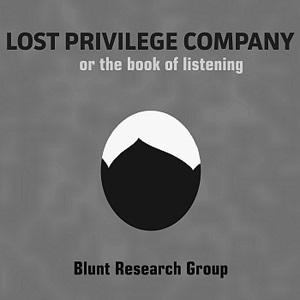 Lost Privilege Company, or the book of listening
Lost Privilege Company, or the book of listening
By The Blunt Research Group
It is not hard to get people to think about their legacies. For many of us, it is one of the driving factors of our lives, sometimes passing the boundary of obsession with how we will be remembered. But I think the question of legacy is far more complicated that most are willing to acknowledge. It exists beyond mere perception and the excuse of plausible deniability. I believe The Blunt Research Group is operating under such a notion with their collection Lost Privilege Company, or the book of listening. The group, the members of which importantly remain nameless in the book, have taken up the cause of creating wonderfully imperfect echoes of voices long past. In doing so, the reader is asked to disengage from self-absorption and consider what is truly happening around them. Lost Privilege Company, or the book of listening is a combination of poetry collection and an almost polite manifesto, one that holds up the fragments of lives and souls and memories so that we might look upon what we have wrought.
The poetry of Lost Privilege Company is created and delivered within a fascinating and horrifying constraint – every phrase of the poem comes from the case files of imprisoned juveniles, a disproportionate amount of whom were children of color. Many of these children were offered up for pseudo-scientific experimentation and left at the mercy of eugenics researchers who sought evidence to confirm their deeply prejudiced beliefs. Make no mistake: this is not a conspiracy theory or something out of an Orwell novel. As the introduction to the book explains, such “science” is a very real part of American (and especially Californian) history. This context, the pulling of lines from case files, adds a deeply unsettling and immersive quality to the poems. To be sure, the poems are beautiful on their own, crafted with intimate care and profound connections, but the atmosphere around each of them is akin to having discovered the case files yourself and being forced to confront the ashes of potential beauty.
as a method of discipline
the boy’s mother put coal oil on paper lit it
and held it to her children’s feet
The “inmates” are described as having been incarcerated for antisocial behavior and delinquency, and each poem is constructed as a tribute to one of the children. The refusal to obey traditional structure pays homage to those who, even at a young age, would defy the enforcement of social norms. The interspersing of lines from the wards throughout each poem echoes the judgment and psychological intrusions that these “professionals” would force upon the children. The fading of names behind the text of each poem is a beautiful, bone-chilling, and multi-level reminder of how little is left of the victims. Many of these children were sterilized. Many of them died. Many had their sanity and identities discarded for the sin of nonconformity. But the files, and now these poems, are what remain. Doubtless for many cases, they are the only recourse to memory left.
not a dirtier boy in the house vile
and effeminatetaking short cuts across orchards
The second half of the book is given over to a space called “the book of listening”. Here, the form changes from poetry to prose, or perhaps prose poetry. It makes no attempt to define itself. Each page of this section contains a stand-alone thought, or sequence of thoughts, that never plays out in more than a paragraph.
Having somehow gained permission to listen to an unknown voice, must one pledge not to harm or betray that voice? What would that mean? And would it ever be possible not to break one’s vow, one’s oath, to the voices one has solicited?
In our sociological environment, one that has yet again proven itself to be full of echo chambers and unknown voices, I find the thoughts presented of Lost Privilege Company to be beautiful and poignant. The text questions and questions, leaving little unexamined, exploring good intentions and responsibility, as well as whether ignorance is any excuse. Are we absolved of the sins of our fellow humans simply because we were not aware of the atrocities or the hate that spawned them? What obligation do we have in the aftermath of such things, even (or perhaps especially) when all that is left are the pieces of past? I described this section of the book as a “polite” manifesto, and I really mean that. This is not meant to indoctrinate or make demands. Rather, it asks questions and leaves you to sit in your new awareness, having pricked the bubble of your comfort zone.
In reading this book, I am reminded of a quote that is very debatably attributed to Edmund Burke: “All that is necessary for the triumph of evil is that good men do nothing.” To be clear, this quote is hilariously and depressingly ironic because of its gender bias and because that kind of willful inaction in the face of tragedy is a hallmark of the conservatism Burke championed. But the spirit of the quote, the idea that inaction is dangerous and creates complicity, is powerfully echoed in Lost Privilege Company. The book stretches out its hands, full of the remnants of the otherwise unremembered, and asks you what will you do now.
Lost Privilege Company is available now through Noemi Press.
